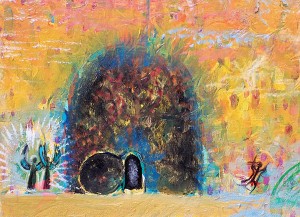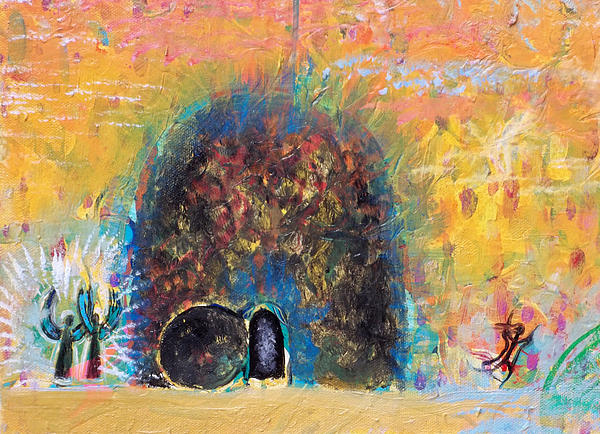Encore presentation of a great discussion of all things Easter. First released 12 March 2013. Enjoy the old bumpers and their music!
 With a forty-day Lenten season that flows to a conclusion in Holy Week and its beautiful rituals, for many Christians, Easter (even more than Christmas) marks the spiritual high point of the year. At no other time do sacred time and space collapse quite so easily, with events and liturgies and encouragements that lead people in sustained reflection about not only their gratitude for Christ and their beliefs and hopes about salvation, but even more generally, the renewal of aspirations, plans, and energies. While Mormons join with the rest of the Christian world in basic beliefs about Christ’s resurrection and central role in salvation, and they, too, celebrate Easter, they don’t do it in quite as sustained a manner as many other Christian traditions who carry into their worship centuries-long traditions and fully developed music and liturgies and portals into the mysteries of the resurrection miracle.
With a forty-day Lenten season that flows to a conclusion in Holy Week and its beautiful rituals, for many Christians, Easter (even more than Christmas) marks the spiritual high point of the year. At no other time do sacred time and space collapse quite so easily, with events and liturgies and encouragements that lead people in sustained reflection about not only their gratitude for Christ and their beliefs and hopes about salvation, but even more generally, the renewal of aspirations, plans, and energies. While Mormons join with the rest of the Christian world in basic beliefs about Christ’s resurrection and central role in salvation, and they, too, celebrate Easter, they don’t do it in quite as sustained a manner as many other Christian traditions who carry into their worship centuries-long traditions and fully developed music and liturgies and portals into the mysteries of the resurrection miracle.
In this five-part series, the same amazing panel who shared about Christmas—Jared Anderson, Zina Petersen, and Kristine Haglund—join Mormon Matters host Dan Wotherspoon on a journey through scripture, history, worship, and celebration related to Easter. Designed to be informative about elements with which Mormons in general are not all that familiar, it also explores different presentations of Christ’s final acts on earth in the various Gospels and scriptural tradition, the range of views about what “resurrection” means, how Christian and Pagan traditions interacted to create the mix of elements we find in Easter season, and how these elements combined to create some of the world’s greatest music, poetry, and pageantry. But it also explores personal realms. How do each of the panelists integrate a love for Easter themes, claims, symbols, and rituals with their own empirically oriented and critical brains? What is happening in their hearts and minds as they celebrate Easter?
The podcast totals nearly five hours. It’s a huge bite, and it can certainly be taken slowly.
__________
A brief guide to the parts:
Parts 1 and 2 (episodes 373 and 374) focus primarily upon the scriptural record, with its earliest layers, differences between texts, interaction with Jewish elements, the “empty tomb” traditions as separate from “resurrection appearances.” They explore various Christological theories and their different approaches to the idea of resurrection. Listen also for some really great poetry and fresh angles that would make great sermon materials.
Parts 3 and 4 (episodes 375 and 376) take us from the early church to the middle ages and on through the centuries, helping us understand the development of various traditions and interactions with solar and lunar cycles and their feasts and celebrations. These also contain great information about and peeks into the beauties of Lent, Holy Week, rituals such as meditations on the “stations of the cross,” and much more. History and aesthetics! What could be better?
Part 5 (episode 377) features the panelists and host sharing their own Easter experiences and reflections on myth and ritual, rational thought and the mysteries of spirituality.
We very much hope you’ll enjoy these episodes! Please use the comments section below to share your own reflections on Easter and all that this season means to you.


Comments 7
So beautiful – the fifth hour was probably my favorite. I enjoyed listening to the variety of accounts of several traditions.
As a side note, are there any podcasts discussing John the Baptist, or do any of you have recommendations on looking up more on him and the traditions surrounding him?
Author
None on John the Baptist. That is an interesting idea! Thank you. I love the wild man in the desert aspects of his ministry. We could also talk Nazarite vows and things like that (though not a settled issue that he was one who had taken those). And much more. Any recommendations for panelists? Have you read someone on him that might be great to invite on? Thanks, again!
No, I’ve had trouble finding in depth coverage on him. I’ve read the Mandaen gospel of John and read up as much as I could on the holy Wild Man tradition of the Middle Ages, which I think led up to the Mountain Man tradition in the U.S., which seems to be fading out. Most of my sources are rather speculative and not scholarly. I don’t really know where to look. I became interested in John the Baptist when I directed Oscar Wilde’s SALOME in college. As he seems to be a “genuine” and “verifiable” historical figure, I have been supposing there would be more information on him somewhere.
Hi Dan, loving these episodes. I’m wondering if there’s somewhere I can find links to all the music and poetry and other resources mentioned in the podcast?
Agree, I thought the music and poetry was wonderful.
Author
An MM listener, Carma Hyde, sent me these to post. Two of the things Kristine mentioned or quoted:
John Updike (1932–2009) published the following poem, “Seven Stanzas at Easter,” in 1960.
Make no mistake: if He rose at all
it was as His body;
if the cells’ dissolution did not reverse, the molecules
reknit, the amino acids rekindle,
the Church will fall.
It was not as the flowers,
each soft Spring recurrent;
it was not as His Spirit in the mouths and fuddled
eyes of the eleven apostles;
it was as His flesh: ours.
The same hinged thumbs and toes,
the same valved heart
that–pierced–died, withered, paused, and then
regathered out of enduring Might
new strength to enclose.
Let us not mock God with metaphor,
analogy, sidestepping, transcendence;
making of the event a parable, a sign painted in the
faded credulity of earlier ages:
let us walk through the door.
The stone is rolled back, not papier-mâché,
not a stone in a story,
but the vast rock of materiality that in the slow
grinding of time will eclipse for each of us
the wide light of day.
And if we will have an angel at the tomb,
make it a real angel,
weighty with Max Planck’s quanta, vivid with hair,
opaque in the dawn light, robed in real linen
spun on a definite loom.
Let us not seek to make it less monstrous,
for our own convenience, our own sense of beauty,
lest, awakened in one unthinkable hour, we are
embarrassed by the miracle,
and crushed by remonstrance.
______
The Airy Christ
By Stevie Smith
After reading Dr Rieu’s translation of St Mark’s Gospel.
Who is this that comes in splendour, coming from the blazing East?
This is he we had not thought of, this is he the airy Christ.
Airy, in an airy manner in an airy parkland walking,
Others take him by the hand, lead him, do the talking.
But the Form, the airy One, frowns an airy frown,
What they say he knows must be, but he looks aloofly down,
Looks aloofly at his feet, looks aloofly at his hands,
Knows they must, as prophets say, nailèd be to wooden bands.
As he knows the words he sings, that he sings so happily
Must be changed to working laws, yet sings he ceaselessly.
Those who truly hear the voice, the words, the happy song,
Never shall need working laws to keep from doing wrong.
Deaf men will pretend sometimes they hear the song, the words,
And make excuse to sin extremely; this will be absurd.
Heed it not. Whatever foolish men may do the song is cried
For those who hear, and the sweet singer does not care that he was crucified.
For he does not wish that men should love him more than anything
Because he died; he only wishes they would hear him sing.
Stevie Smith, “The Airy Christ” from New Selected Poems. Copyright © 1972 by Stevie Smith. Reprinted by permission of New Directions Publishing Corporation.
Source: The New Selected Poems of Stevie Smith (New Directions Publishing Corporation, 1988)
Easter at last! Wonderful, making my way through.